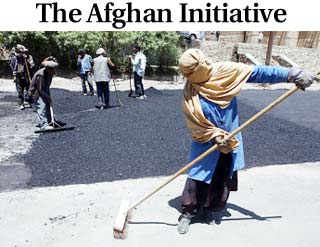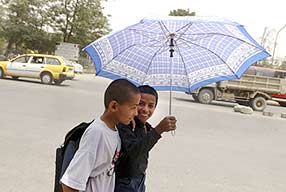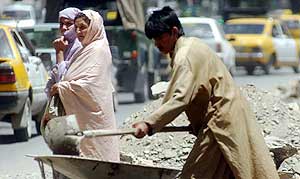Home > News > Specials
The Rediff Special/Sheela Bhatt
August 01, 2003

India has enhanced its involvement in Afghanistan.
New Delhi currently spends around $100 million on various projects and $70 million on the reconstruction of a 213-kilometer road from Zaranj to Delaram in Afghanistan. This 'new silk route' road is the result of a project between India, Iran and Afghanistan to develop trade with Central Asian countries such as Uzbekistan, Kazakhstan and Turkmenistan. The route will utilize the Chah Bahar port in Iran to send goods to Afghanistan and to Central Asian countries.
India's hyperactivity in Afghanistan owes much to Vivek Katju, India's ambassador in Kabul.
An official source told rediff.com that New Delhi has gifted three Airbus aircraft along with crew to support Arian Afghan Airlines, and more than 270 Indian buses currently ply in Kabul, Kandahar and Herat.
Last February, 18 Afghan judges and lawyers were trained at the Indian Law Institute in New Delhi. An IT specialist has been deputed to the Afghan government. In the foreign minister's office in Kabul, a local area network with Internet access via Videsh Sanchar Nigam Ltd has been set up while Afghan bureaucrats are being trained in the use of computers.
Three Reserve Bank of India officials were deputed to the Central Bank of Afghanistan in July 2002. A team of 30 Indian doctors treats thousands of patients every week while $4 million has been allotted for the rehabilitation of the Indira Gandhi Institute of Child Health. New Delhi will gift 300 vehicles to the Afghan National Army once Pakistan allows their transit.
A peeved Pakistan allows Afghan exports to India via Wagah, but not vice versa. Thus, every day, a large numbers of trucks cross Wagah carrying dry fruits and carpets but return empty.
Compared to Afghanistan's huge needs, India's efforts are no doubt little but then no country is doing as much as India except for the United States, which spends $900 million annually.
"We have our own strength in Afghanistan," an Indian diplomat told this correspondent.
A former Research and Analysis Wing chief told rediff.com, "For the first time, India's foreign policy and intelligence policy are working in harmony."
So far, India's efforts in Afghanistan have the backing of the United States and Russia.
India's interests are two-fold: it does not want the Taliban to resurface; and it wants the new Afghan security structure to be free of anti-India elements.

On August 12, NATO will take over the security of Kabul. NATO is likely to hold informal consultations with India before the 19-member military alliance sends the International Stabilization and Assistance Force to Afghanistan.
The ministry of external affairs has not issued an official reaction so far to NATO taking over Kabul's security.
Since it will be the first NATO operation in India's extended neighborhood, some Indian experts have voiced their concerns, especially since NATO has already held informal talks with Pakistan and China.
"India will have to watch out for Pakistan and China's reactions to NATO's presence," warned P Stobdan, a scholar attached to the Institute of Defence Studies and Analyses, New Delhi.
He pointed that there are two sides to the game. India's increased activity in Afghanistan would possibly make Pakistan more active in Nepal, Bhutan, and Bangladesh.
An Indian diplomat defended India's policy. "We are not working from the prism of Pakistan; we are enabling Afghanistan to get back its Afghan identity."
Critics of India's Afghan policy fear New Delhi might not be able to sustain its high level of activity.
Said Stobdan, "India's policy in Afghanistan may not sustain in the long run. Before Taliban rule India was doing too little, too late; now, we are doing too many things, too early. Road projects are okay, but I doubt if anything will come out of it. India is over-ambitious."
A K Verma, former chief of the Research and Analysis Wing, India's external intelligence agency, agrees that India cannot remain inactive, but says, "India is paying tax in the form of assistance which is a part of positive diplomacy. But the reality remains that Afghanistan is too unstable. India's strategic interests are unlikely to be met here."
"At the end of the day," he adds, "India and Afghanistan are friends but Pakistan and Afghanistan are brothers. Also, Afghans know India's limitations."
India's increased level of activity in Afghanistan has naturally not gone down with Pakistan.
On July 22, it voiced its concern at India's establishment of diplomatic missions in six cities of Afghanistan, saying the missions 'will serve purposes other than diplomacy.'

Pakistan has particularly objected to the opening of Indian diplomatic missions in Kandahar and Jalalabad, cities where the dominant ethnic tribes are more averse to Pakistanis.
According to observers and experts in New Delhi, Islamabad believes its adversaries dominate the Kabul government, which is friendly to India and Iran. Pakistan is also suspicious about the intelligence cooperation between India and the US against Al Qaeda operatives in Afghanistan, perceiving it as a threat to its security.
Sridhar, a professor of international relations and an expert on Afghanistan, said Islamabad finds itself sandwiched between India's overwhelming military presence in the east and New Delhi's growing goodwill in the west.
Photographs: Darren McCollester/Getty Images